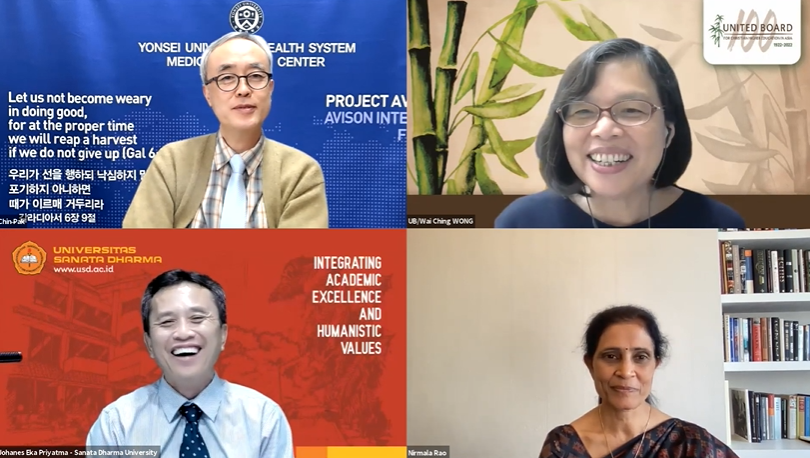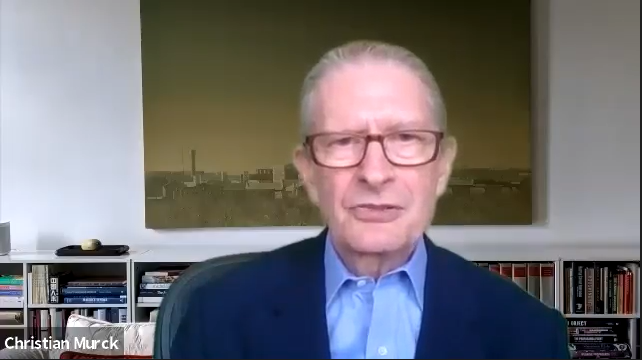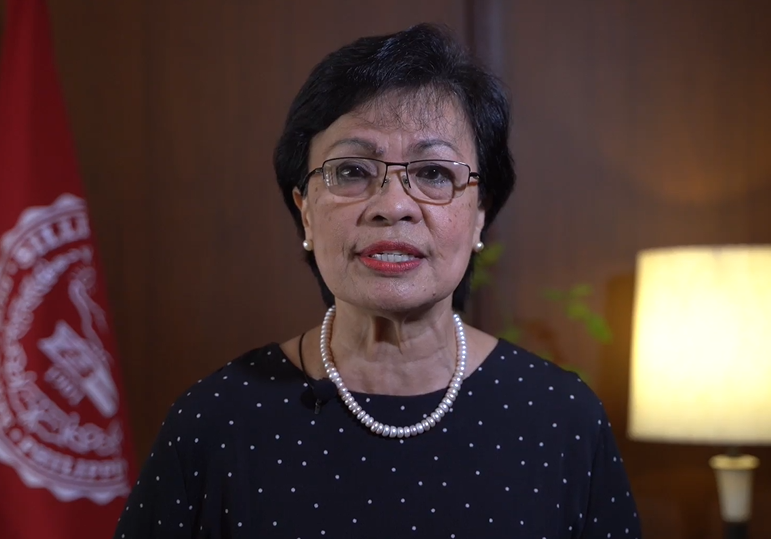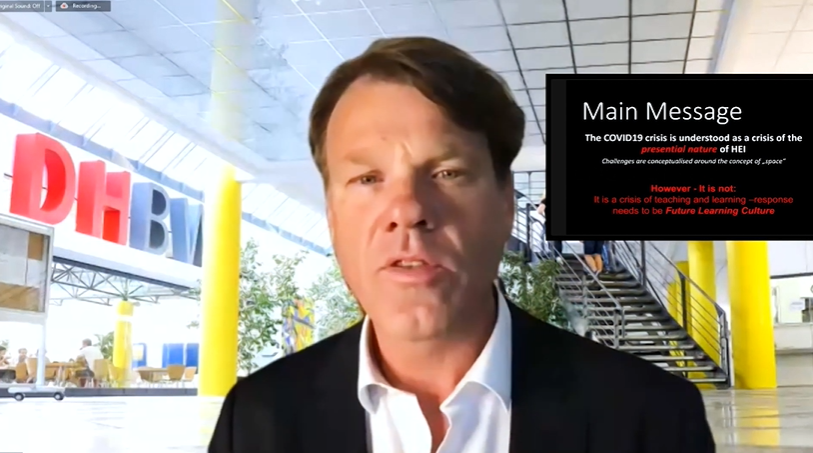
Joint Consultation opens with discussions on future skills, access to education
The virtual Joint Consultation of the Association of Christian Universities and Colleges in Asia (ACUCA), Silliman Universty (SU), and the United Board opened July 16, 2021 with discussions on developing students’ competencies, access, equity, and inclusion in higher education.
Attended by representatives of Christian higher education institutions (HEIs) in Asia, the three-day consultation aimed to gather HEIs to discuss their preferred futures in the face of current issues that affect education and society brought about by the COVID-19 pandemic.
Dr. Christian Murck, Board of Trustees chair of the United Board, said in his welcome message that the speed, resilience, and creativity of HEIs in adapting to the COVID-19 pandemic is something to be proud of.

Dr. Christian Murck
“Now, we are at the point in time where we should begin to think about the future, what lessons we can draw from our recent experience, what kind of future do we want, and how can we take action to bring it into being.”
Murck also reassured that the United Board will maintain its 100 year-long commitment to support HEIs in Asia and that partnership and consultation are important in helping young people develop their minds, hearts, and consciousness to better serve their families, communities, and societies.
In her welcome message, Dr. Betty Cernol McCann, SU and ACUCA president, called for collaboration and unity among Christian HEIs for them to meet today’s challenges in education, citing the United Board and ACUCA networks as examples.

Dr. Betty Cernol McCann
“The United Board, now on its 100th anniversary, has been instrumental in the formation of the Association of Christian Universities and Colleges in Asia, now 45 years since its founding; a step that, earlier on, saw the importance of collaboration among institutions in the region.
McCann also identified the challenges that need to be addressed by Christian HEIs, which will be discussed during the three-day Joint Consultation: determining preferred futures for higher education in Asia and beyond; issues of access to education, equity, and inclusion; and how to work together in teaching, research, and community service to help heal communities affected by the COVID-19 pandemic and address issues on climate justice and sustainability for future generations.
Future skills
Dr. Ulf-Daniel Ehlers, Educational Management and Lifelong Learning professor at the Baden-Württemberg Cooperative State University in Germany who served as the keynote speaker during the first day of the Joint Consultation, talked about developing future skills among students in HEIs.

Dr. Ulf-Daniel Ehlers
In his talk, titled “Future Skills: Future Learning and Future Higher Education,” Ehlers explained that future skills are not the same as digital skills or literacy.
“Future skills are really a matter of developing professional competencies,” said Ehlers.
Skills or competencies, he said, go beyond the concept of being able to do certain tasks, knowledge, and employability.
“‘Skills’ are already a concept which means that…an individual can deal with an unforeseen future. That’s the very core of the concept of competence and skills…You are able to deal with the future in which you meet problems which you do not know, which you are not trained to deal with,” he said.
In developing future skills among students, Ehlers said there is a need for higher education systems to enable students to deal with an unknown and unforeseen future.
“Higher education has a special task. Higher education is an autonomous field which is charged with helping young people to think beyond what we teach them. They should not just go away and take away exactly the knowledge which we give to them, but they should think beyond that…They should be able to be individuals [who] walk away from our higher education institutions capable of understanding the volatile and uncertain world of the future; understanding this world, analyzing this world, and taking action,” said Ehlers.
HEIs, said Ehlers, should not just prepare students for the labor market but educate them as a way to shape society.
“They (students) need to be able to perform on the labor market but they need also to go beyond that. They need also to be able to work, function, live, and shape society as active citizens,” he added.
To explain future skills as a more encompassing, abstract concept, Ehlers and his team set up a website called nextskills.org where they listed 17 different kinds of future skills or competencies based on their research.
The competencies or “future skill profiles” include learning literacy, self-efficacy, self-determination, self-competence, reflective competencies, decision competencies, ambiguity competencies, ethical competencies, among others.
Ehlers asked HEIs to consider these future skill profiles in the kind of education they offer, challenging them to integrate the development of future skills in their curriculum instead of merely adding them as a course or subject.
Access, Equity, and Inclusion
In the first “Conversation” panel discussion for the Joint Consultation, access, equity, and inclusion in higher education were discussed by panelists Dr. Johanes Eka Priyatma, rector of Sanata Dharma University in Indonesia; Prof. Nirmala Rao, vice chancellor of Asian University for Women (AUW) in Bangladesh; and Dr. Chin-Yong Pak, director of Yonsei University Health System’s Medical Mission Centre in South Korea, with Dr. Wong Wai Ching, vice president for programs of the United Board, as the moderator.
The panelists talked about how the problems in access, equity, and inclusion have existed for a long time in certain countries due to various factors, such as economic disparity, political challenges, religious and cultural traditions that influence gender, ethnic, racial, or caste differences.

(Top-Bottom, L-R) Dr. Chin-Yong Pak, Dr. Wong Wai Ching, Dr. Johanes Eka Priyatma, and Prof. Nirmala Rao
Priyatma pointed out that the pandemic did not cause the said problems but made them “worse,” citing the educational situation in Indonesia as an example.
“The main problem is the low economic ability of most Indonesian people to access higher education services, which ultimately triggers equity and inclusion issues,” he said.
With different, complex factors affecting the access, inclusion, and equity of education, Priyatma said “using information technology as a system for education is not that simple.”
Wong noted that the sudden shift to online distance education due to the pandemic created a reliance on digital technology for teaching and learning, which widened the gap between those who can afford technology and those who cannot.
Rao, who shared the experience of AUW as an all-female university adapting to the sudden shift to online distance education, said: “Access is not equitable across gender and income categories.”
In Bangladesh, Rao said the rate of women enrolled in higher education has increased in recent years but the rate is still lower compared to its neighboring countries, with gender, income, and socio-cultural factors affecting access to education.
“Around 85 percent [of students in AUW] are on full scholarship, which tells you the backgrounds that they come from,” she added.
Rao explained that AUW mostly provides education opportunities for women in disadvantaged communities, where it can be difficult to promote higher education for women.
Expandability of education
During the Conversation, the panelists also talked about possible solutions to bridge the gaps in access to education, equity, and inclusion.
For AUW’s experience in addressing these issues, Rao said AUW provided resources such as mobile data packs for their students with no internet access. AUW also worked with community centers in different countries where their students resided so that students could have a place in their country where they could access the internet for their education.
“Using these public spaces in the future so that, physically, students don’t have to travel to the university, wherever it’s located, is a wonderful idea for those experiencing technical problems in accessing the internet,” said Rao.
Pak mentioned the concept of the “expandibility” of education instead of its accessibility.
Accessibility, Pak explained, relies on students finding ways to acquire education through physical or digital means, while expadibility is the opposite because it is about HEIs bringing education closer to students.
Bringing education to students, said Pak, is not limited to digital means, suggesting that HEIs can coordinate with established units in communities like local churches to set up a “post” or station in the community that can serve as an HEI’s facility where students can go to to access the internet.
Pak also urged HEIs to reflect on the role of universities amid the social issues worsened by the pandemic, and said that to address these issues, changes must be made in the curriculum, in the way information is delivered, and in how educators interact with students.
“Universities do not just transfer the information from professor to teacher. We have to help students so that they can live in the society as they learned in the school. We have to help them develop their character and their devotion to the community and in the society,” said Pak.
Priyatma mentioned the concept of cybernetic space, a learning model that can be a way to overcome the problem of access to education.
“A cybernetic space is an integration of both physical and virtual space at the same time. Our education ecosystem will be more efficient…Using this approach, we need not require students to come to campus for the whole year. Many learning activities could be optimized using digital platforms, but some are much better if they are done physically, such as practical work,” said Priyatma.
To further discuss about access, equity, and inclusion, a breakout session among participants was conducted for them to share their reflections on the keynote message and panel discussion.
Dr. Hope S. Antone, Faculty Development director of the United Board, served as the overall facilitator during the Joint Consultation’s first day.
With the theme “Envisioning Christian Higher Education: Our Preferred Futures,” the virtual consultation aims to facilitate cooperation among HEIs in creating action plans with strategies in addressing two of the most pressing issues today: inequality in access to education and technology, and climate justice and sustainability.
Dr. Wilma Tejero, ACUCA general secretary and SU Economics Department chair, led the virtual consultation as head of the SU Working Committee with SU being the host institution of this international event.
The consultation was also organized to celebrate the rich histories of the institutions and networks of ACUCA and UB; in time for ACUCA’s 45th anniversary, SU’s 120th founding anniversary, and UB’s 100th celebration in 2022.


